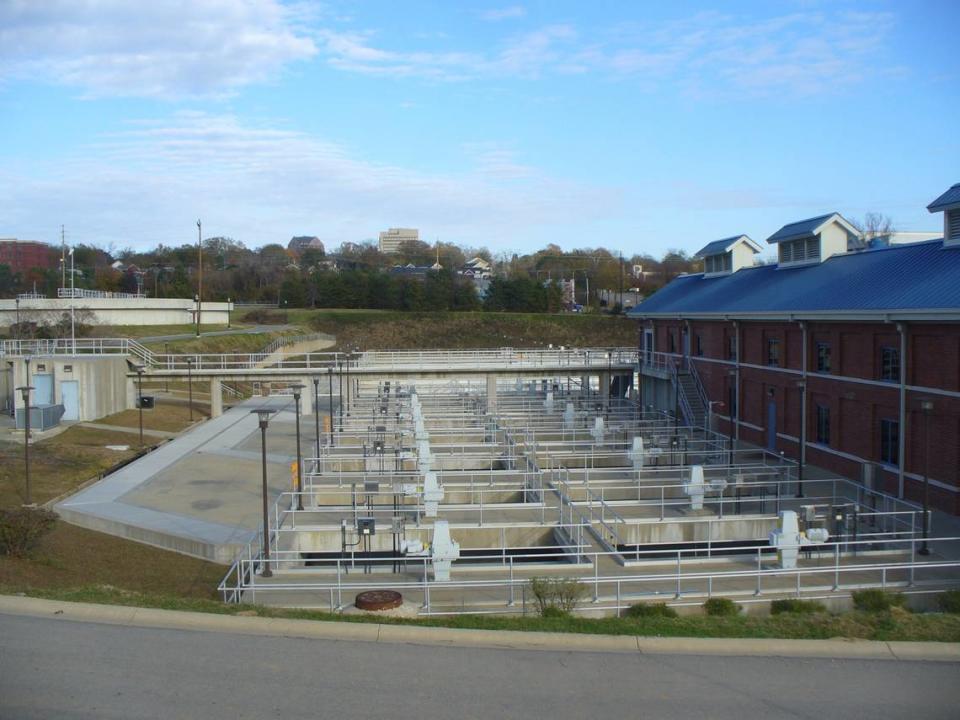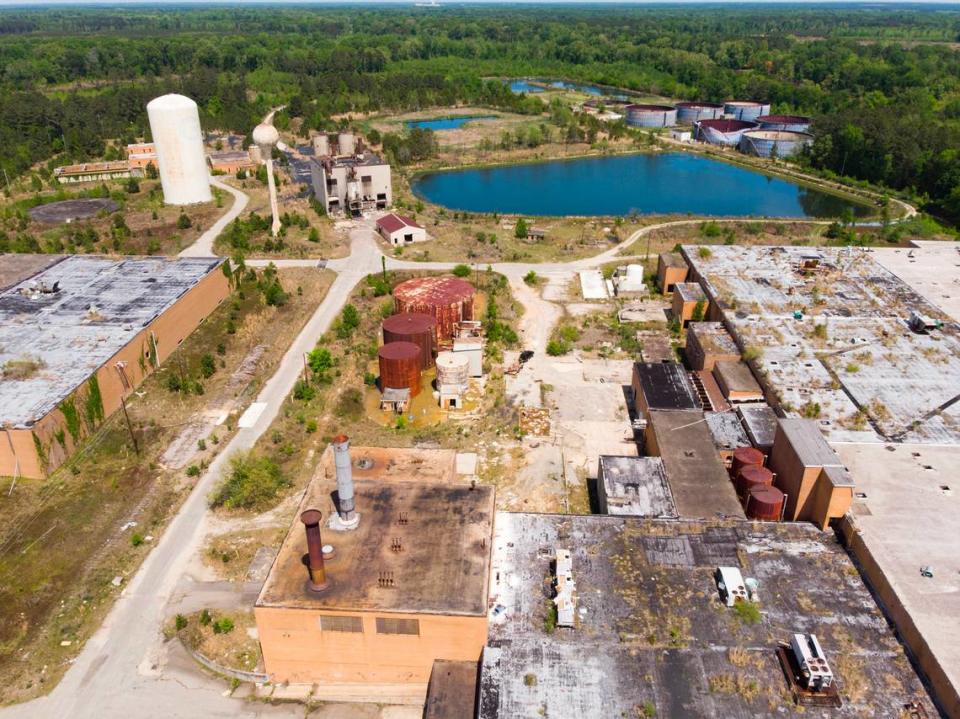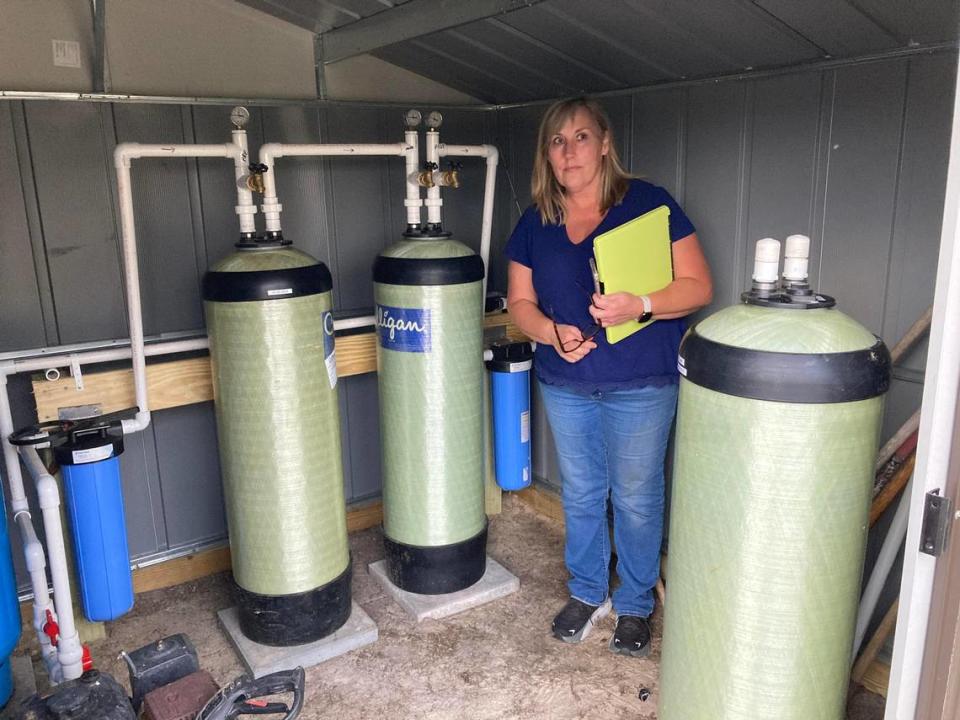Industries polluted Columbia’s water with dangerous ‘forever chemicals,’ city’s lawsuit claims
More than 40 textile companies, chemical manufacturers and other industries have for years polluted Columbia’s municipal water supply with “forever chemicals,” a class of man-made compounds that can cause cancer and other health ailments, according to a major lawsuit filed by the city this week.
Columbia’s lawsuit, filed in Richland County state court, is significant because, if successful, the city stands to collect possibly hundreds of millions of dollars that would go toward the purchase and installation of expensive filtration equipment necessary to remove the chemicals, formally known PFAS.
Current filtration techniques at Columbia’s waterworks are not adequate to get the toxic chemicals out of the city’s drinking water supply, the lawsuit said. The PFAS family of synthetic chemicals do not break down in nature and move relatively quickly in water, the lawsuit said.
“Through no fault of its own, Columbia must upgrade its water and wastewater treatment facilities to adequately address Defendants’ PFAS,” the lawsuit said.
The lawsuit did not specify a dollar figure but Columbia city officials have estimated the cost to upgrade the municipal waterworks with a PFAS-filtering system could top $150 million. Running the system could increase the city’s costs by $24 million annually, city officials have said.
Defendants in the case include some of the nation’s major manufacturers and distributors of PFAS: 3M, Daikin America, and Dupont and related companies. The companies have been sued nationally by those who say they were hurt by the manufacture and distribution of the dangerous chemicals.
But the suit names an array of other companies that used PFAS, some with connections in the Upstate and Columbia area. Among them are BASF Corporation; Burlington Industries Inc.; Cone Mills Receiver; Shaw Industries; FUJIFILM Manufacturing U.S.A. Inc; Milliken & Company; Mitsubishi Chemical America Inc.; Carolina Plating; and T & S Brass and Bronze Works Inc.
Companies knew or should have known about the dangers of PFAS and the manufacturers didn’t fully disclose the risks, according to the Columbia lawsuit.
In one instance, 3M began testing animals in the 1970s and 1980s to see if PFAS caused cancer, as was suspected, the lawsuit says. The company, however, had to quit one study because all of the monkeys died after being exposed to one type of forever chemical.
In 1978, a “3M interoffice correspondence concluded that ‘recent animal studies have shown that (one PFAS compound) is more toxic than was previously believed.’‘’
A lead scientist at 3M quit in 1999, disappointed at how the company had dealt with the environmental risks of some forms of PFAS, the lawsuit said.
Asked about the lawsuit, a 3M company spokesman said, “As the science and technology of PFAS, societal and regulatory expectations, and our expectations of ourselves have evolved, so has how we manage PFAS. 3M will address PFAS litigation by defending itself in court or through negotiated resolutions, all as appropriate.”
Closer to home, The State last year highlighted troubles at a Cone Mills Receiver site in Union County that released forever chemicals near the Broad River, which supplies Columbia’s canal drinking water plant about 60 miles downstream.
The suit says Cone Mills and Carlisle Finishing discharged PFAS into the Broad River. Consultants have submitted a cleanup plan for the site, which closed several years ago. Former owners have said they are working to resolve problems.
Columbia is seeking compensatory and punitive damages “to the fullest extent allowed by South Carolina law,’’ the lawsuit says. “This includes but is not limited to compensatory damages to upgrade Columbia’s water and wastewater treatment technology to be able to remove all PFAS from drinking water and wastewater, filtration equipment, piping, and other necessary infrastructure.”
The Columbia lawsuit is modeled on numerous other lawsuits around the country being brought against companies that use or produce various kinds of chemicals. A recent New York Times news article described PFAs as “one of the major pollution issues of our time.”
The lawsuits, including Columbia’s, allege that companies have known for years the PFAS chemicals are toxic and can cause an array of adverse health effects, including various cancers and birth defects.
The explosion nationally of PFAS lawsuits against companies has been described as similar to the tidal waves of litigation against tobacco and asbestos companies in years past. In the recent years, companies around the nation have settled various lawsuits alleging PFAS contamination in public water sources for billions of dollars, according to news accounts.
Under a settlement in one major class action PFAS case, approved this spring by U.S. Judge Richard Gergel of Charleston, 3M expects to pay about $10.3 billion over 13 years to more than 11,000 public water systems contaminated with PFAS chemicals. DuPont could pay up to $3 billion under that settlement.

Columbia could have received about $12 million from the settlement, but decided to go its own way in suing the PFAS-producing companies.
The city said the $12 million would not be nearly enough to cover its costs to clean up the water and comply with new federal limits on forever chemicals. City officials have expressed worries that they would have to raise water rates to help pay for the federal requirement.
“We opted out because we are looking at the bigger picture,” Columbia Mayor Daniel Rickenmann said earlier this year. “We are ready to look at the real costs of the finalized PFAS rules and then go on to take our own legal action soon.’’
Some cities, including Cayce, opted to accept money through the settlement brokered in Gergel’s court in Charleston.
In Columbia’s lawsuit, many of the defendant corporations have facilities in the Upstate region of South Carolina, a traditional textile manufacturing area.
“Many of South Carolina’s textile manufacturers used ...’forever chemicals,’ to impart stain resistant and non-stick properties to textiles,” the city’s lawsuit said.
PFAS found in rivers
The lawsuit said that the Broad River and the Saluda River, which is dammed to form Lake Murray, both contain PFAS in concentrations above what the EPA now considers safe.
Columbia operates two drinking water treatment plants and one wastewater treatment plant.
One drinking water plant draws water from the Columbia Canal via an intake on the Broad River in downtown Columbia. It can produce 84 million gallons of drinking water a day. The other drinking water plant draws water from an intake at Lake Murray and can produce 75 million gallons of drinking water per day.
The wastewater plant can treat 60 million gallons a day.
All three plants must be upgraded with the expensive filtration technology to remove the PFAS chemicals, the lawsuit said. The canal and lake water plants serve more than 370,000 customers, making Columbia one of South Carolina’s largest drinking water suppliers.

The city’s lawsuit claims that manufacturers and users of PFAS basically ran the material through treatment plants that failed to remove all the forever chemicals.
Those chemicals then wound up in waterways upstream from Columbia, flowed to Lake Murray and the Broad River and eventually migrated into Columbia’s water treatment facilities, the lawsuit alleges.
Scientific studies “have shown that exposure to some PFAS in the environment may be harmful to people and animals,” the EPA said. Exposure to them can increase risks of kidney cancer, testicular cancer, thyroid disease and immune system deficiencies, among other ailments. There are thousands of PFAS chemicals, which are used in consumer, commercial and industrial products.
Forever chemicals are found in the blood of people and animals all over the world, the EPA says.
PFAS chemicals were developed more than 80 years ago and have been used in a variety of products, such as non-stick frying pans, stain resistant carpet and waterproof clothing. They are called forever chemicals because they don’t break down easily in the environment.
This spring, the EPA issued a rule that for the first time restricts the level of certain forever chemicals in drinking water. The limit for two of the most common types of forever chemicals, known as PFOA and PFOS, is 4 parts per trillion, with a handful of others now limited to 10 parts per trillion.
Columbia’s challenges in meeting tighter water standards on PFAS aren’t unique in South Carolina. Utilities across the state face hundreds of millions of dollars in costs to cleanse drinking water now that the federal government has finalized the rule to make water safe from the potentially cancer-causing toxins.
All told, more than 50 South Carolina utilities that draw water from the ground or from rivers and lakes exceeded one or both of the limits on PFOA and PFOS, according to data released last year by the S.C. Department of Health and Environmental Control. Those included drinking water systems in Columbia, Cayce and West Columbia, as well as Camden, Charleston, Greenwood, Florence, Georgetown, Gaffney and Myrtle Beach.
In addition to Columbia, attorneys representing other interests in South Carolina also have filed lawsuits against manufacturers and suppliers of forever chemicals. Those include suits on behalf of rural residents in Darlington County, whose backyard wells are alleged to have been polluted by sewer sludge from an abandoned industrial plant. The State detailed the issue in its series “Toxic Deals,’’ last year.
Meanwhile, environmentalists have formally threatened to sue Shaw Industries in Irmo over discharges to the Saluda River watershed.
At the state level, South Carolina Attorney General Alan Wilson filed two PFAS-related lawsuits in state court in Richland County last year.
One suit alleges harm done to South Carolina by PFAS contamination from all PFAS-containing sources other than firefighting foam. Defendants are 3M, DuPont, and DuPont’s related entities.
The other lawsuit filed by the attorney general alleges harm done to South Carolina by PFAS contamination resulting from firefighting foam use. Defendants in that case include 3M, DuPont and its related entities, and several manufacturers and distributors. That lawsuit has since been removed to ongoing federal multi-district litigation being overseen by Judge Gergel.
Aqueous film-forming foam, or AFFF, is a product used to fight fires. The PFAS chemicals in AFFF have entered the environment, contaminating it and causing harm to South Carolina’s natural resources, the lawsuit alleges.
PFAS lawsuits difficult
Before a PFAS lawsuit is filed, lawyers must do “massive preparation,” said Joe Rice, a Charleston attorney with a national reputation for his work in asbestos, tobacco, 9/11 funding, opioids and other complex litigation.
That work includes consulting experts in chemistry, geology, economics and diseases, he said.
“Unfortunately, you don’t know everything when you first file,” Rice said, adding that the legal process allows for lawyers to do discovery, or the subpoenaing of records and the taking of depositions from defendants or related parties.
“That takes a lot of work,” Rice said.
The PFAS litigation is “clearly one of the most complex scientific and expert driven cases that I’ve ever dealt with because we are having to do things such as recreate the manufacturing of chemicals and how they break down in water sources and trace 30 - 40 years’ worth of sales records to determine who is responsible,” Rice added.
Rice is a lead co-counsel in the PFAS litigation before Judge Gergel. Within that litigation, his firm, Motley Rice, is representing numerous water service providers, public entities, private landowners and individual firefighters battling occupational diseases, among others.
Lawyers filing Columbia’s lawsuit are Amy Hill and Will Lewis of the Richardson Thomas law firm in Columbia, and the Friedman, Dazzio & Zulanas law firm in Birmingham, Alabama. The Friedman law firm has extensive experience in PFAS litigation and recently achieved a settlement of at least $100 million in a Georgia PFAS case.



